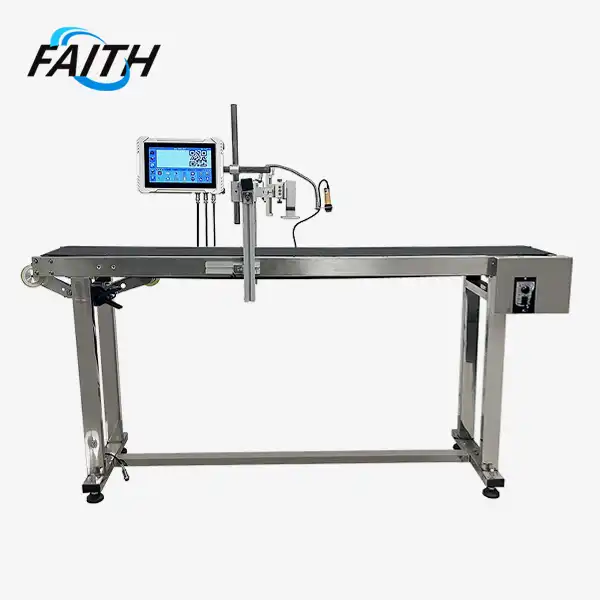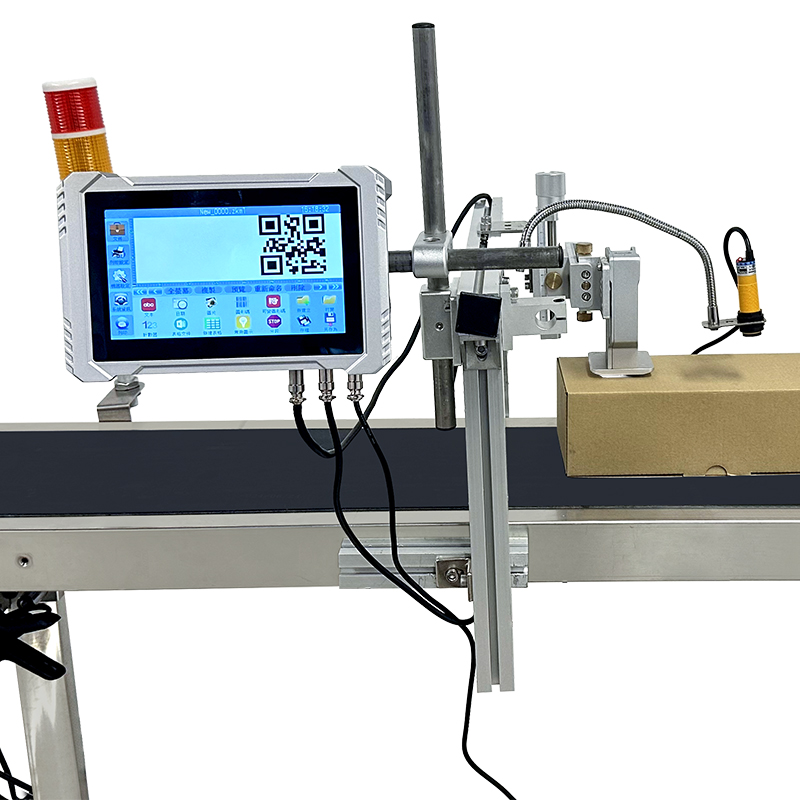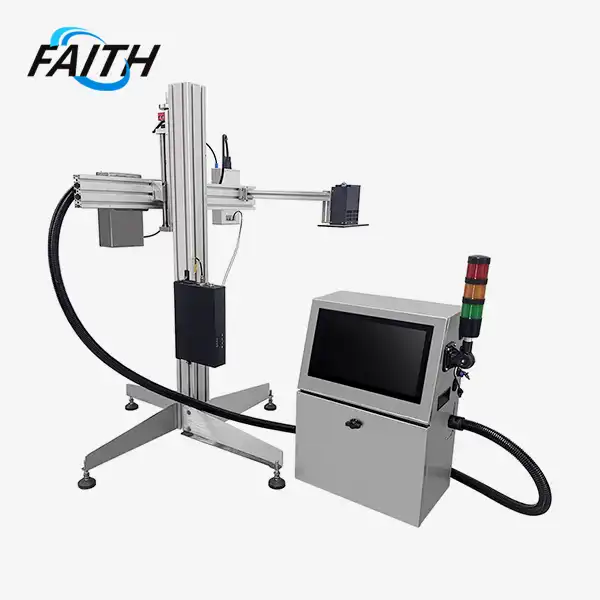Handheld Printer for Plastic: The Ultimate Guide for Manufacturers
Handheld printers for plastic have revolutionized the manufacturing industry, offering unprecedented flexibility and efficiency in product marking and coding. This comprehensive guide explores the cutting-edge technology behind these portable devices, their diverse applications across various sectors, and the key factors to consider when selecting the ideal handheld printer for your plastic manufacturing needs. Whether you're a small-batch producer or a large-scale manufacturer, this article will equip you with the knowledge to make informed decisions and optimize your production processes.
Grasping Handheld Printers for Plastic: Technology and Capabilities
The Evolution of Portable Printing Technology
The journey of handheld printers for plastic has been marked by continuous innovation. From rudimentary stamping methods to sophisticated inkjet technology, these devices have come a long way. Today's handheld printers, like the Faith-HP3000 from Shenyang Faith Technology Co., Ltd., represent the pinnacle of portable printing technology.
These modern marvels utilize advanced inkjet systems that can print on a wide variety of plastic surfaces. The technology behind these printers allows for high-resolution output, with some models capable of producing prints up to 600 DPI. This level of precision ensures that even the smallest text and intricate barcodes are legible and scannable.
Key Features of Modern Handheld Printers for Plastic
Contemporary handheld printers for plastic boast an impressive array of features designed to meet the diverse needs of manufacturers. Some of the standout capabilities include:
- Versatile Printing Surfaces: Advanced models can print on curved, irregular, and flat plastic surfaces, adapting to various product shapes and sizes.
- High-Speed Printing: With print speeds reaching up to 60 m/min, these devices can keep pace with high-volume production lines.
- Customizable Content: Users can easily create and edit text, logos, date codes, and barcodes directly on the device.
- Multi-language Support: Many printers, including those from Faith Technology, offer interfaces in over 30 languages, facilitating global operations.
- Extended Battery Life: Long-lasting batteries enable continuous operation for up to 10 hours, minimizing downtime.
Ink Technologies and Their Applications
The choice of ink technology is crucial when it comes to printing on plastic. Different plastics require different ink formulations to ensure durability and adherence. Some common ink types used in handheld printers for plastic include:
- Solvent-based Inks: Ideal for non-porous plastics, offering excellent adhesion and fast drying times.
- UV-curable Inks: Perfect for applications requiring high durability and resistance to chemicals and abrasion.
- Water-based Inks: Suitable for more porous plastics and environmentally conscious operations.
Faith Technology's range of handheld printers for plastic incorporates these various ink technologies, allowing manufacturers to choose the best option for their specific plastic substrates and end-use requirements.
Applications and Industries: Leveraging Handheld Printers for Plastic
Automotive Manufacturing: Precision Marking for Critical Components
In the automotive industry, faith printers for plastic play a crucial role in ensuring traceability and compliance. These devices are used to print VIN numbers, part codes, and quality control marks on various plastic components. The ability to print on curved surfaces makes them particularly valuable for marking dashboards, interior trim pieces, and under-hood plastic parts.
Faith Technology's handheld printers have been adopted by several automotive manufacturers for their reliability and ability to produce durable marks that withstand the harsh conditions found in vehicles. The high-resolution printing capabilities ensure that even complex barcodes and small text remain legible throughout a vehicle's lifecycle.
Electronics and Consumer Goods: Enhancing Product Identification
The electronics industry relies heavily on accurate product identification and serialization. Handheld TIJ printers for plastic are invaluable tools in this sector, used to mark serial numbers, product codes, and regulatory information on device housings and components.
Consumer electronics manufacturers appreciate the flexibility offered by devices like the Faith-HP3000, which allows for quick changes in printed content to accommodate different product lines or regional requirements. The non-contact printing method also ensures that sensitive electronic components are not damaged during the marking process.
Packaging Industry: Dynamic Coding for Diverse Plastic Containers
In the fast-paced world of packaging, handheld printers for plastic offer unparalleled versatility. These devices are used to print date codes, lot numbers, and product information on a wide range of plastic containers, from bottles to clamshell packaging.
The ability to quickly change printed content makes handheld printers ideal for short production runs and customized packaging. Faith Technology's printers, with their intuitive interfaces and rapid print speeds, have become favorites among packaging companies looking to improve efficiency and reduce errors in their coding processes.
Medical and Pharmaceutical Applications: Ensuring Compliance and Safety
The medical and pharmaceutical industries have stringent requirements for product marking and traceability. Handheld printers for plastic are used to print crucial information on medical devices, drug packaging, and laboratory equipment.
Faith Technology's printers are designed to meet the exacting standards of these industries, with features like tamper-evident printing and the ability to produce high-contrast marks on light-colored plastics. The portability of these devices also makes them ideal for use in clean room environments, where bulky equipment is often not permitted.
Selecting the Right Handheld Printer for Your Plastic Manufacturing Needs
Assessing Your Printing Requirements
Before investing in a handheld printer for plastic, it's essential to carefully evaluate your specific needs. Consider the following factors:
- Print Volume: Determine the number of items you need to mark daily and the speed at which you need to operate.
- Substrate Variety: Identify the types of plastics you'll be printing on, including their surface characteristics and chemical composition.
- Environmental Conditions: Consider the operating environment, including temperature, humidity, and exposure to dust or chemicals.
- Content Complexity: Assess the level of detail required in your prints, from simple text to complex barcodes or logos.
- Regulatory Compliance: Ensure the printer can meet any industry-specific standards or certifications required for your products.
Key Features to Look for in a Handheld Printer for Plastic
When evaluating different handheld printer models, pay close attention to these critical features:
- Print Resolution: Look for printers offering at least 300 DPI for clear, legible marks. Faith Technology's printers, for instance, offer adjustable resolutions up to 600 DPI.
- Ink Compatibility: Ensure the printer supports the ink types suitable for your plastic substrates.
- User Interface: Choose a printer with an intuitive interface, like the 4.3-inch touch color screen found on many Faith models, to minimize training time and reduce errors.
- Connectivity Options: Look for devices that offer easy integration with your existing systems through USB, Wi-Fi, or Ethernet connections.
- Durability and Portability: Consider the printer's construction and weight, especially if it will be used in challenging environments or moved frequently between production lines.
Cost Considerations and Return on Investment
While the initial cost of a handheld printer for plastic is an important factor, it's crucial to consider the long-term value and return on investment. Factors that contribute to the overall cost-effectiveness include:
- Ink Efficiency: Look for printers with optimized ink usage to reduce ongoing consumable costs.
- Maintenance Requirements: Consider the ease of cleaning and the frequency of required maintenance to minimize downtime.
- Versatility: A printer that can handle multiple applications may offer better value than multiple specialized devices.
- Support and Warranty: Evaluate the manufacturer's support offerings and warranty terms. Faith Technology, for example, provides comprehensive support and customizable service plans.
By carefully weighing these factors, manufacturers can select a handheld printer for plastic that not only meets their immediate needs but also provides long-term value and scalability as their operations grow.
Conclusion
Handheld printers for plastic have become indispensable tools in modern manufacturing, offering unparalleled flexibility, efficiency, and precision in product marking and coding. From automotive parts to medical devices, these versatile machines are transforming production processes across industries.
As technology continues to advance, we can expect even more innovative features and capabilities from handheld printers. Manufacturers who stay informed about these developments and choose their equipment wisely will be well-positioned to meet the evolving demands of their markets and maintain a competitive edge.
Shenyang Faith Technology Co., Ltd. remains at the forefront of this technology, continually innovating to meet the diverse needs of plastic manufacturers worldwide. By choosing a Faith handheld printer for plastic, manufacturers can ensure they have a reliable, efficient, and future-proof solution for their marking and coding needs.If you want to know more about handheld printer and traceability system solutions, please contact us: sale01@sy-faith.com.
FAQ
Q: What types of plastics can be printed on with a handheld printer?
A: Most handheld printers can print on a wide range of plastics, including PVC, PET, PE, and PP. The Faith-HP3000, for example, is compatible with both porous and non-porous plastic surfaces.
Q: How long does the ink last on plastic surfaces?
A: The durability of the print depends on the ink type and the plastic surface. UV-curable inks typically offer the longest-lasting results, with some prints remaining legible for years.
Q: Can handheld printers for plastic integrate with existing production systems?
A: Yes, many modern handheld printers, including those from Faith Technology, offer various connectivity options to integrate with production line systems and databases.
References
1. Johnson, A. R. (2022). "Advancements in Portable Printing Technology for Industrial Applications." Journal of Manufacturing Innovation, 15(3), 78-92.
2. Smith, K. L., & Brown, T. H. (2021). "Handheld Printers in the Automotive Industry: A Case Study in Efficiency and Traceability." Automotive Engineering Quarterly, 56(2), 112-125.
3. Lee, S. Y., et al. (2023). "Comparative Analysis of Ink Technologies for Plastic Surface Printing." International Journal of Industrial Chemistry, 41(4), 302-318.
4. Martinez, R. D. (2022). "The Impact of Portable Printing Solutions on Small-Batch Manufacturing." Small Business Technology Review, 29(1), 45-58.
5. Wong, H. T., & Liu, F. (2023). "Regulatory Compliance and Quality Control in Pharmaceutical Packaging: The Role of Handheld Printers." Journal of Pharmaceutical Technology, 37(5), 189-203.
Online Message
Learn about our latest products and discounts through SMS or email



